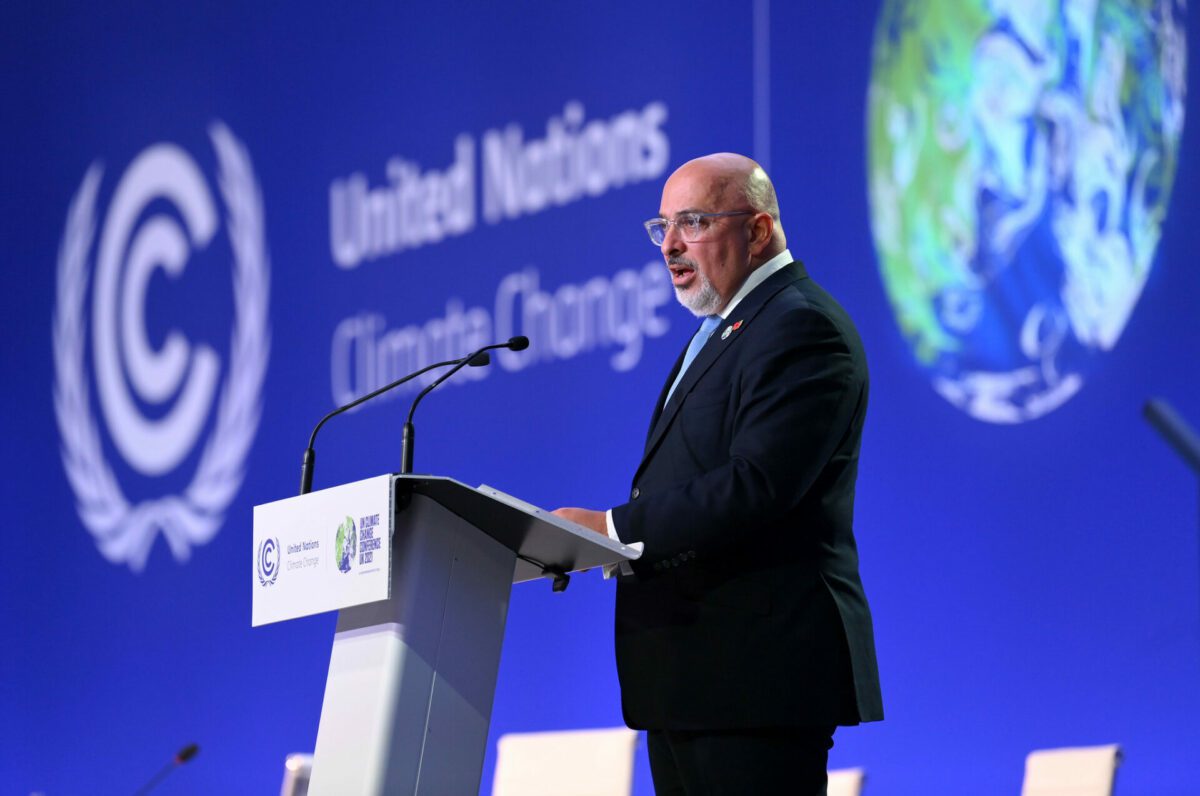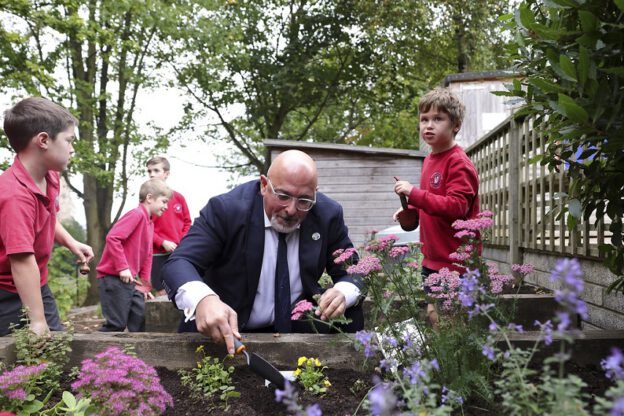Further Education teachers will be required to integrate sustainability into their teaching

#COP26: @NadhimZahawi is putting the fight against #ClimateChange at the heart of education
Announcing a range of measures in a speech at COP26 (5 Nov), Education Secretary Nadhim Zahawi will set out his vision for all children to be taught about the importance of conserving and protecting our planet.
Young people will be empowered to take action on the environment as part of new measures designed to put climate change at the heart of education.
These measures, brought together in a draft sustainability and climate change strategy, will be built on over the next 6 months in collaboration with young people, educators, sustainability experts and environmentalists before the final publication of the strategy in April 2022.
From December 2021, all Further Education (FE) teachers trained via an apprenticeship will be required to integrate sustainability into their teaching, through modelling sustainable practices and promoting sustainable development principles in relation to their subject specialism.
Teachers will be supported to deliver world-leading climate change education through a model science curriculum, which will be in place by 2023, to teach children about nature and their impact on the world around them.

Children and young people will also be encouraged to get involved in the natural world by increasing biodiversity in the grounds of their nursery, school or college by taking small steps like installing bird feeders.
They will be able to upload their data onto a new, virtual National Education Nature Park – which will allow them to track their progress against other schools in the country, increase their knowledge of different species and develop skills in biodiversity mapping.
Combined, the grounds of schools, colleges, nurseries and universities in England take up an area over twice the size of Birmingham, so improving their biodiversity could have a significant impact on the environment.
New Duke of Edinburgh style Climate Leaders Award
Children and young people will also be able to undertake a new Climate Award in recognition for their work to improve their environment, with a prestigious national awards ceremony held every year.
The Climate Leaders Award will help children and young people develop their skills and knowledge in biodiversity and sustainability, and celebrate and recognise their work in protecting the local environment.
For example, young people may choose to undertake a project that delivers change in their local community, such as increasing the biodiversity of a neighbourhood piece of land or helping to deliver experiences for younger children to explore nature and local woodland.
It will be developed in collaboration with children and young people so that we can ensure it supports them in making an impact in their local communities.
Pupils and students will be able to progress through different levels of the award, ‘bronze’, ‘silver’ and ‘gold’, in a similar way to the Duke of Edinburgh Awards.

Education Secretary Nadhim Zahawi said:
“We want to deliver a better, safer, greener world for future generations of young people and education is one of our key weapons in the fight against climate change. Empowering teachers in every school to deliver world-leading climate change education will not only raise awareness and understanding of the problem, but also equips young people with the skills and knowledge to build a sustainable future.
“The COP26 summit has further amplified the UK’s commitments to become a world leader in sustainability right across the education system by engaging young people and bringing them on our journey towards net zero and a green future.
“And it goes beyond the classroom – out National Education Nature Park and Climate Leaders Awards will let pupils get hands on experience of understanding, nurturing and protecting the biodiversity around them.”
These measures will also build on government’s pledge for every new school delivered under the Department’s school rebuilding programme to be cleaner, greener and net-zero in operation.
Innovative new Energy Pods to supply heating and hot water without any carbon emissions
The Education Secretary will also confirm plans to test innovative new Energy Pods that can replace gas and coal boilers and supply all a school’s heating and hot water without any carbon emissions. These are being tested first in some schools and then could be rolled out to other public sector buildings.
‘Energy Pods’ are a low to zero carbon plug and play technological solution which provide heating and hot water to existing school settings via solar panels and technology to maximise their output.
The innovation will first be tested in some schools and colleges and if successful could be extended across the school estate and into more public sector buildings.
Today’s announcement comes as part of the Department’s commitment to keep the education system at the forefront of sustainability and innovation and help meet the government’s target of reducing emissions by 78% by 2035 and reaching net zero by 2050.
As well as launching the draft Sustainability and Climate Change Strategy, the Education Secretary will host a panel session, in partnership with Italy and UNESCO, at COP26 attended by education ministers from around the world.
He will chair the session and let education ministers from around the world talk about what they are doing and make formal pledges to take significant actions.
Sector Reaction

David Hughes, Chief Executive, Association of Colleges said:
“Achieving net zero is not optional, it is existential, and putting climate change at the heart of education is a vital part of delivering it. This draft strategy from DfE is a good step forward. Colleges stand ready to do everything they can to create a sustainable future through the education and training they support for over 2 million people every year – from young people through to adults.
“COP26 is showing us that creating the green economy and a secure future needs a collaborative, concerted and long-term effort. No single organisation or sector on its own can overcome the climate crisis. The strategy shows that DfE will use its leadership and convening powers to help nudge, encourage and support the collective and individual actions which will move us to net zero, improve biodiversity and change behaviours for a more secure future. This draft strategy sets us on a promising net zero journey for colleges, their students, and other stakeholders who need to come together over the next 6 months to challenge each other to collectively make the differences we all want to see.
“We have already been working at pace through the Climate Commission for UK Higher and Further Education and last month colleges boldly set out their ambitions to deliver the green skills our labour market needs, build sustainability into every subject and to transition their own activities to net zero. There is strong alignment between this strategy and our own approach as set out in The Green College Commitment.
“Young people want to see action and are looking to schools, colleges and universities to empower them with the knowledge and skills that will support them to build a sustainable future. Adults too want to be part of this green future, so we must remove barriers for them in accessing retraining or upskilling to be able to plug skills gaps in priority areas.
“Colleges will do their bit and it looks as though DfE is pledging in this strategy to do its bit too. That has to be welcomed, as long as the strategy quickly moves onto actions and delivery. ”
James Bowen, director of policy for school leaders’ union NAHT, said:
“School are fully committed to playing their part in tackling climate change. There is a huge amount of good work already taking place in schools to reduce their carbon footprint, and we know this generation of pupils are passionate about bringing about meaningful change.
“A coherent national strategy is essential if we are to see real impact. The government must be truly ambitious, not just looking to new buildings, but also at how the existing school estate can be made as environmentally friendly as possible.
“Many schools are already actively teaching pupils about the importance of conserving and protecting our planet through their existing curriculum. It’s vital that any work on a new model curriculum is developed in close consultation with the profession and builds on the excellent work already taking place.”
Graham Frost, NAHT national executive member and headteacher of Robert Ferguson Primary School in Carlisle, who proposed a motion encouraging the teaching of the climate crisis to NAHT’s annual conference in 2019, said:
“Education is almost universally considered the means by which we build for a better future, so we simply have to equip children with the knowledge they need to challenge politicians and business leaders to act urgently on climate change.
“School leaders cannot ignore the growing pupil voice on climate change, and children cannot articulately challenge the powers-that-be without being educated. I have seen young people speak truth to power. I have also witnessed their despair with elected officials who think personal changes such as using a different soap or recycling plastic is sufficient response to looming environmental catastrophe. Equipped with scientific knowledge, our pupils can see that system-wide technological, political, sociological and economic changes on at a local and global level are urgently and desperately needed.”
UNESCO Assistant Director-General for Education Stefania Giannini said:
“For the future of our planet, we need to learn for our planet. We welcome the United Kingdom’s commitment to climate education though its efforts to place sustainability at the heart of their education system.
“New UNESCO data found only half of national educational frameworks have a reference to climate change in them so we are partnering with the Department for Education for today’s event at COP26 where global education leaders will be able to make pledges that set out how they will tackle climate change through education in their countries.”
Italian Minister of Education Patrizio Bianchi said:
“These steps from the UK, as well as the many other pledges we have received, recognise the vital role of education in the fight against climate change. In Italy, we have introduced climate and sustainability education as a key part of learning to provide everyone with the knowledge, skills, values and attitudes to learn for our planet and act for positive change.
“If other countries do the same as us, the UK and other G20 nations then we stand a better chance of winning this fight.”

Kevin Courtney, Joint General Secretary of the National Education Union, said:
“There are steps in the DFE’s sustainability plan that we can welcome strongly, and that we will be very pleased to engage further on.
‘The stated ambition to have world leading climate education is very welcome but we have to be aware that the current bar is set very low, is potentially a low bar given the paucity of climate education worldwide.
‘We welcome the notion of expanding the amount of climate education in the STEM curriculum but believe that this needs to be extended into wider areas of the curriculum such as religious education, economics, history, geography, and the arts – and we will want to engage further with DfE on this. It requires teacher training and curriculum space.
‘Planning for all new school buildings to have zero emissions is welcome but we also need to look at retrofitting the current school estate.
The notion of energy pods that can be used to replace existing heating systems is interesting but at the moment is still in a research phase.
We want to work with DfE on plans for a well-funded and resourced programme of works which is supportive of schools not something which is an extra burden on overworked head teachers or their school budgets.
‘One area not so far mentioned in the DfE’s plans – travel to school by students – is currently very carbon intensive and this has to be addressed by joint working between the education and transport departments.

National Union of Students (NUS) Vice-President for Further Education Hillary Gyebi-Ababio commented:
“The education system must play a central role in our transition to a sustainable society.
“It’s vital the Government recognises that climate change awareness needs to be taught across our curriculum. After years of inadequate action from politicians, we must equip students with the skills and knowledge needed so that they can tackle this crisis and meet the green jobs of the future.
“Rather than supporting the Cambo oilfield development and investing in fossil fuel infrastructure, the government needs to finally take this issue seriously. Alongside local authorities and Universities, the government should listen to the student movements’ demands and immediately divest from fossil fuels, the arms trade, and other unethical industries.
“Sustainability must also mean transforming where we learn, and this should include retrofitting all educational buildings. Across the student movement, we are reimagining a new vision for education, where our education system inspires and empowers students to build a sustainable world”.











Responses